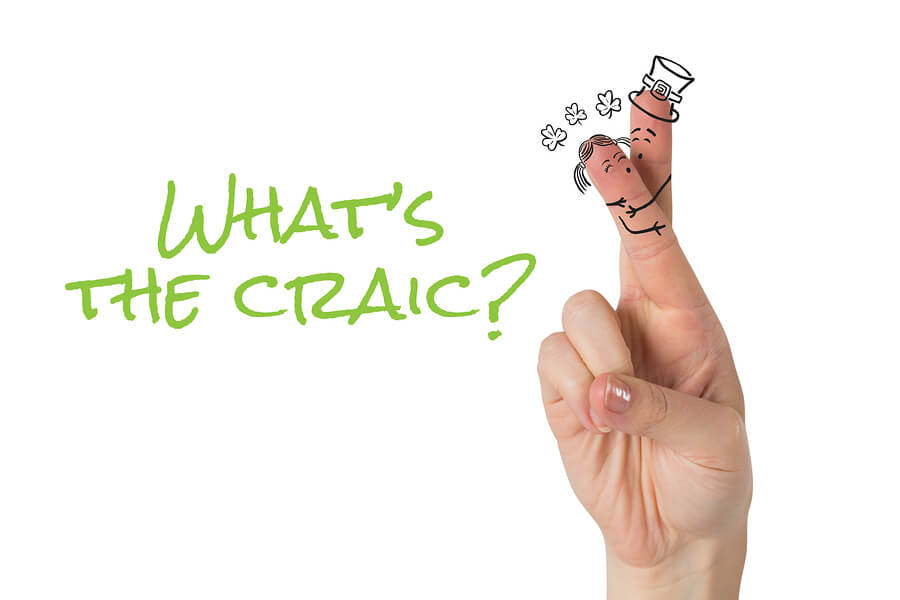STUDYING abroad in Ireland seems like a completely reasonable thing to do if you’re a monolingual English speaker and don’t necessarily have time to pick up another language before you embark on your adventure. However, as you’ll soon realise once you start interacting with people outside of Dublin City Centre, Ireland is home to a variety of languages besides just English. Irish is the first official language of the State and can be seen on most road signs, and can be heard spoken, even in urban centres, if you know what you’re listening for. There are also growing Polish and Nigerian communities – a recent census indicates that Polish is the second most commonly spoken language in Ireland after English!
It stands to reason, then, that students studying abroad in Ireland will almost certainly run into some linguistic eccentricities, both in English and in Irish, throughout the course of their stay in Ireland. Here are some useful phrases you’ll need for study in Ireland.

Craic
This is probably the most ubiquitous word in Irish slang. Everyone knows it now, but for those who don’t, craic is an Irish word that has been borrowed into English. It does not have anything to do with drugs; instead it means that particular brand of fun you can only have in Ireland. It can be used in Irish “Ó, bhí craic go leor againn aréir!” (‘We had a lot of fun last night!’), or in English, where something can be described as being ‘great craic!’
Gas
In Irish slang, gas means something (or someone) is fun, entertaining, or generally enjoyable to be around
Ar an drabhlás/on the lash/on a bender
(Air an drow-las)
The Irish here basically means “to go carousing”, so basically if one of your new Irish friends uses any of these phrases, they’ve been out drinking. You typically don’t start a night with the intention of going ar an drabhlás, it just kind of happens and you talk about it later. Basically any time you go out with the intention of going on a bender, you end up maybe three drinks in and then go home for an early night. It’s the days where you just go out for a quiet pint that inevitably end up completely mental. To tie it together with craic, your Irish speaking friends might say something along the lines of “Bhí muid ar an drabhlás areir, agus go raibh sé craic go leor!” (‘We were on the lash last night and it was great fun!’)
Naggin
A naggin is a 200 ml bottle of spirits, and can be bought basically anywhere that sells food or other types of alcohol. They tend to be really popular, as you can easily slip them into your bag. When someone is having a problem or is anxious about something, a common solution is “couple naggins, be grand.” The word naggin seems to be exclusive to the Republic, in Northern Ireland, they use “quarter glass” for the same size bottle.
Sparch
This one is Galway-specific, and is a verb meaning “to go sit at the Spanish Arch on a sunny day with your friends, drinking, typically from cans.” Unfortunately, because my year in Galway had absolutely miserable weather, I have still not been able to do this.
Yer man/yer one (wan)
This is used to indicate someone who is not a part of the conversation, whose name you either don’t know, or don’t want to use. Much to the confusion of all of my American friends, it doesn’t refer to anyone you are at all related to, or have had any interaction with. You do occasionally hear “yer woman”, but “yer one” or “yer wan” is used significantly more frequently. Also, the pronunciation of “yer” is imperative, just to prevent any confusion that you are, in fact, talking about someone’s partner.
The best example I can think of is from the Republic of Telly sketch, You know you’re Irish when, where one of the characters is trying to remind someone else about who she is talking about: “Yer man, you know him, you do! He drinks Heineken down at the local!”
Give out
To give out to someone is both to complain at them and to tell them off for something. It’s typically an informal thing, your boss or supervisor wouldn’t necessarily give out to you, but your mother absolutely will.
Gowl
While this isn’t polite, you’re certain to hear it everywhere, especially if your friends are anything like mine. The word gowl comes from the Irish gabhal, (pronounced the same way), which means ‘fork’. You can easily be a gowl, especially if you’ve pissed someone off.
Bollix/ed
To bollix something up is to ruin it, which is similar to the British usage of ‘bollocks’, but it can also be an insult. For someone to be a bollix means they are completely useless. For example, “That gowl bollixed up the wheels on my bike, give out to him the next time you see him, will you?”
After doing
This is a direct calque from Irish into Hiberno-English. It comes from “tar eis rud a déanamh”, literally “after doing a thing”, which is a perfective grammatical form. At the most basic level, it’s another way of saying “I have done something”, but it’s fairly ubiquitous in Irish speech, regardless of where you are in the country.
Ireland’s languages are peppered with so many idiomatic expressions that it’s impossible to list even a fraction of them. Even after living in Ireland, and interacting with Irish people daily even after moving back to the States, I still find myself confused about what some of these phrases could possibly mean. But after a while, when you’re chatting to your family back home, you’ll catch yourself saying things like, “And she was giving out to yer man, who is an utter gowl!” and you’ll realise that what was once completely incomprehensible is now entirely familiar.